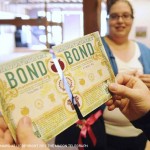 Recently I wrote about the I Love Bees game/challenge that was created to help promote the video game Halo way back in 2004. The game mobilized around 600,000 participants to follow the clues and eventually solve the riddle.
Recently I wrote about the I Love Bees game/challenge that was created to help promote the video game Halo way back in 2004. The game mobilized around 600,000 participants to follow the clues and eventually solve the riddle.
There is a growing sense that games are a great vehicle not just for promoting other games, but to achieve a socially worthwhile outcome too.
Take a game that was launched in Macon, Georgia back in 2011 for instance. Residents of the town were given a bond that was redeemable for sums varying between $10 and $100.
Prior to the start of the game, each bond was cut in half, with the residents then told that if they wanted to cash in the bond, they had to locate the other half of the bond, which was held with an unknown member of the community.
The game, which was created by the Knight Foundation, was designed to try and help foster a greater sense of community spirit and civic engagement in the town. The $65,000 invested in the game was seen as a worthwhile investment for the greater social cohesion it created, as most of the pairs crossed traditional social lines.
This aspect of the game forced people to mingle with those they wouldn’t ordinarily interact with, all in the name of achieving the common goal of cashing out their bond.
The game was designed to allow residents to locate one another through a number of means, including a dedicated website, social media, and of course, face to face meetings.
The cash prizes given out to residents were also structured in a clever way. Rather than normal cash, the prizes were in the form of Macon Money, which were vouchers that could be spent in businesses in the town (who were then reimbursed with actual money). This was done to try and contain the goodwill generated and ensure a wide spread of gains for the town.
Suffice to say, the game designers then set about measuring the impact the game had on civic engagement in the community. The games designer Benjamin Stokes describes the impact the game had in a talk shown in the video below.
Stokes concludes with a challenge to anyone involved in the numerous social challenges we face to try and devise some way to make games a part of that process.
That sounds like a really neat idea. Like it.
That's a pretty cool idea actually, and I'd imagine very cost effective too.